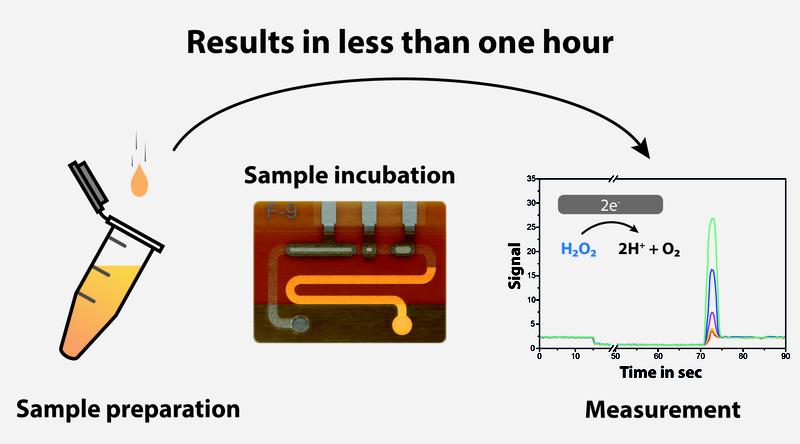

Illustration of the point-of-care testing (POCT) scenario.
Credit: IMTEK – Laboratory for Sensors
Personalized drug therapy, adjusting the dose, dosage intervals, and the duration of treatment to fit individual patients’ needs, are getting more and more important. Frequently, medications are dosed in such a way that each patient receives the same standardized amount of a certain drug.
Thereby, clinical conditions of the patient, such as state of health, metabolism, or other physical factors, are often not sufficiently considered. A researcher team at the University of Freiburg has developed a bioanalytical method which can measure the class of β-lactam antibiotics in human blood on-site – in the operating room, intensive ward or doctor's office, as well as on a house call.
“This way, we can easily determine just how quickly the human body metabolizes a drug,” said the microsystems engineer Dr. Can Dincer, who is the head of the research team. The researchers recently published their results in the journal “Scientific Reports”.
This new method makes it possible to individually adjust the necessary dose of a medication for each patient. “We’ve proven the applicability of our system for a personalized antibiotherapy by on-site monitoring the clearance of drugs in two patients, who were treated with ß-lactam antibiotics, undergoing surgery” Dincer said. “Based on these results, our next step will be to perform a quantitative cohort study that will determine the usefulness of personalized antibiotherapy.”, he added.
Already at the end of 2016, the research team presented its biosensor technology that allows the rapid and simultaneous monitoring of different antibiotics in human blood (www.pr.uni-freiburg.de/pm/2016/pm.2016-11-14.159). In their recently published study, the scientists further developed their system by implementing another natural sensor protein that can quantify β-lactam antibiotics. In human medicine, β-lactam antibiotics are often used to prevent and treat infectious diseases.
Nine researchers from the University of Freiburg were involved in this interdisciplinary study: Richard Bruch, André Kling, Dr. Can Dincer and Prof. Dr. Gerald Urban from the Laboratory for Sensors of the Department of Microsystems Engineering (IMTEK); Balder Rebmann, Dr. Claire Chatelle and Prof. Dr. Wilfried Weber from the Synthetic Biology Lab of the excellence cluster BIOSS Centre for Biological Signalling Studies and the Faculty of Biology; as well as Dr. Steffen Wirth and Prof. Dr. Stefan Schumann from the Department of Anesthesiology and Critical Care of the University of Freiburg Medical Center.
Original Publication:
Richard, Bruch, Claire Chatelle, André Kling, Balder Rebmann, Steffen Wirth, Stefan Schumann, Wilfried Weber, Can Dincer, and Gerald Urban, Clinical on-site monitoring of ß-lactam antibiotics for a personalized antibiotherapy, 2017, Sci. Rep., 7, 3127, http://dx.doi.org/10.1038/s41598-017-03338-z.
Contact:
Dr. Can Dincer
Department of Microsystems Engineering – IMTEK
University of Freiburg
Phone: +49 (0)761 / 203 – 7264
E-Mail: dincer@imtek.de
https://www.pr.uni-freiburg.de/pm-en/2017/personalize-your-medication-dosages












